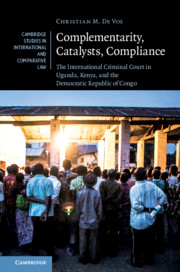 Complementarity, Catalysts, Compliance
Complementarity, Catalysts, Compliance Book contents
- Complementarity, Catalysts, Compliance
- Reviews
- Cambridge Studies in International and Comparative Law: 147
- Complementarity, Catalysts, Compliance
- Copyright page
- Dedication
- Contents
- Acknowledgements
- Table of Cases and Pleadings
- Table of Statutes and Statutory Instruments
- Abbreviations
- Preface
- 1 Introduction
- Part I The ICC and Complementarity: Evolutions, Interpretations and Implementation
- 2 Tracing an Idea, Constructing a Norm
- 3 Mirror Images? Complementarity in the Courtroom
- 4 Leveraging The Hague
- Part II The ICC in Uganda, Kenya and the Democratic Republic of Congo
- Select Bibliography
- Index
- Cambridge Studies in International and Comparative Law: 147
3 - Mirror Images? Complementarity in the Courtroom
from Part I - The ICC and Complementarity: Evolutions, Interpretations and Implementation
Published online by Cambridge University Press: 16 April 2020
- Complementarity, Catalysts, Compliance
- Reviews
- Cambridge Studies in International and Comparative Law: 147
- Complementarity, Catalysts, Compliance
- Copyright page
- Dedication
- Contents
- Acknowledgements
- Table of Cases and Pleadings
- Table of Statutes and Statutory Instruments
- Abbreviations
- Preface
- 1 Introduction
- Part I The ICC and Complementarity: Evolutions, Interpretations and Implementation
- 2 Tracing an Idea, Constructing a Norm
- 3 Mirror Images? Complementarity in the Courtroom
- 4 Leveraging The Hague
- Part II The ICC in Uganda, Kenya and the Democratic Republic of Congo
- Select Bibliography
- Index
- Cambridge Studies in International and Comparative Law: 147
Summary
This chapter offers a detailed review of the International Criminal Court’s (ICC’s) admissibility jurisprudence and argues that this body of case law largely requires states to mirror the same conduct (and even the same factual incidents) that the prosecutor investigates as a precondition for rendering a case inadmissible. While this approach is consistent with the coercive dimension of complementarity, it can also place a heavy burden on states, one that they may be unprepared (or unwilling) to meet. At the same time, the judicial treatment of Article 93(10), which provides the statutory basis for a ‘positive complementarity’ policy has been scant. Complementarity thus appears less as a space for constructive engagement and dialogue than a set of unifying criteria with which states must comply. While court officials and some commentators have defended the ICC’s approach, suggesting that it is technically consistent with the wording of Article 17, others have advocated a more flexible approach. The chapter thus illustrates the tension that arises between complementarity’s policy goals and the ICC’s more narrow, judicial remit. It further suggests that such tension is symptomatic of legalism: It relies on an artificial division between the court as a legal and political actor.
Keywords
- Type
- Chapter
- Information
- Complementarity, Catalysts, ComplianceThe International Criminal Court in Uganda, Kenya, and the Democratic Republic of Congo, pp. 68 - 103Publisher: Cambridge University PressPrint publication year: 2020
